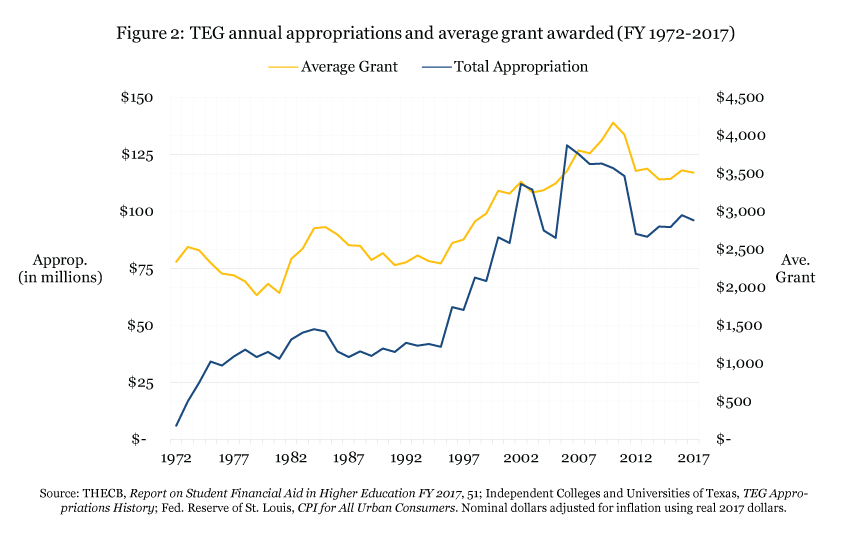Brief: Tuition Equalization Grants
February 22, 2019
A Catholic perspective:
The Texas Catholic Conference of Bishops (TCCB) supports increased funding for tuition equalization grants as part of our support for higher education. As St. John Paul II wrote, the mission of a modern university is to carry on a continuous quest for truth through research, and to preserve and communicate knowledge for the sake of the common good.[1] Successful universities impart civic, economic, and moral benefits upon students. A university’s civic and economic benefits are seen in the good citizens, leaders, scientists, engineers, doctors, and businessmen it produces, while its moral benefit consists in its ability to impart virtue and wisdom. In this way universities contribute to their students’ attainment of happiness, not only their pursuit of it.[2] These benefits should to be open to all Texas children.[3]
Yet as Figure 1 indicates, only 21 percent of Texas eighth graders currently earn a post-secondary credential in the six years after their scheduled high school graduation.[4] Only 12 percent of low-income Texas students earn a post-secondary credential, which is especially troubling since the low-income student population now represents 60 percent of Texas’ public school students. Such students must be provided with opportunities—including through Tuition Equalization Grants—to access higher education.
[1] St. John Paul II, Ex Corde Ecclesiae [On Catholic Universities], The Vatican. (August 15, 1990), Sec. 30, cf. 4.
[2] Jn. 14:6.
[3] Congregation for Catholic Education, Lay Catholics in Schools: Witness to Faith. October 15, 1982. § 3, cf. 56.
[4] THECB, The 8th Grade Cohort Longitudinal Study: 10 Year Anniversary. (October 2017).
A university’s civic and economic
benefits are seen in the good citizens,
leaders, scientists, engineers, doctors,
and businessmen it produces.
Texas law and policy:
To provide the maximum possible use of public and private educational opportunities in Texas, the Texas legislature established the Tuition Equalization Grant (TEG) Program in 1971.[5] TEGs are provided on the basis of financial need and the program is one of Texas’ three key need-based aid programs.[6] Through the TEG program, Texas recognizes that financial aid opens up the benefits of higher education to students who are at an economic disadvantage.
To be eligible for a TEG, a student must be a Texas resident, demonstrate financial need, and meet certain academic benchmarks.[7] For the current 2018-19 school year, the maximum award is $3,364, but students who show exceptional need may receive up to $5,046.[8] In FY 2017, $92.2 million in TEG funds aided 27,374 students with an average grant of $3,507.[9] Figure 2 illustrates the annual legislative appropriation and grant amount since the program’s creation. Thirty-six percent of TEG recipients are at or below the federal poverty level ($24,036) while 69 percent are at or below the median state income ($56,356).[10]
TEGs benefit Texas by both increasing students’ opportunity to attend a private institution and reducing the cost of education to taxpayers. If TEG recipients had enrolled in state universities in FY 2015, the state would have needed to increase appropriations by just over $177 million. In FY 2015, the average TEG of $3,300 saved the state about 50 percent of the estimated taxpayer appropriation of $6,500 for each full-time student at a state university.[11]
[5] 63 RS SB 56 (1971); Texas Edu. Code Ch. 61 § 221-230; Texas Admin. Code Ch. 22, Subchapter B.
[6] Texas Higher Education Coordinating Board, Report on Student Financial Aid in Texas Higher Education: Fiscal Year 2017. September 2018. 50.
[7] Specifically, TEG recipients must be enrolled at least three-fourths time in a degree plan leading to a first degree, meet the institution’s Satisfactory Academic Progress (SAP) requirements if applying for initially eligibility, complete 75 percent of attempted hours each year, complete 24 credit hours if an undergraduate or 18 credit hours if a graduate student, and not receive an athletic scholarship.
[8] Texas Higher Education Board, College for all Texans: Tuition Equalization Grant Program.
[9] Report on Student Financial Aid: FY 2017, 49.
[10] Ibid.
[11] Independent Colleges and Universities of Texas, 2017 TEG Handout. Page 5.

